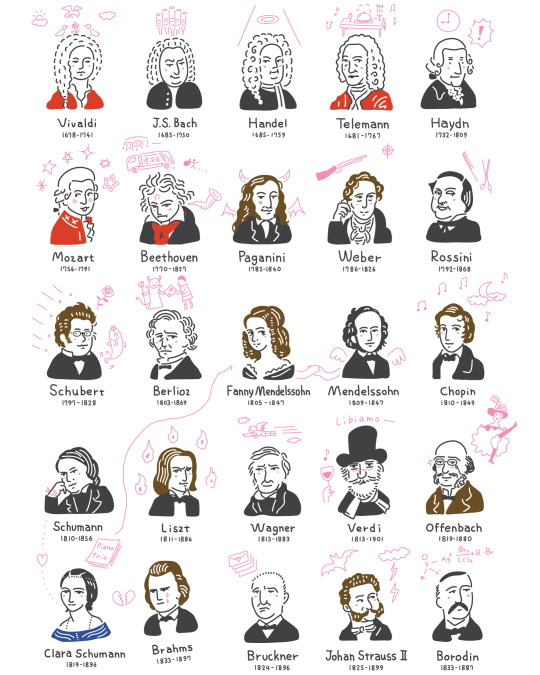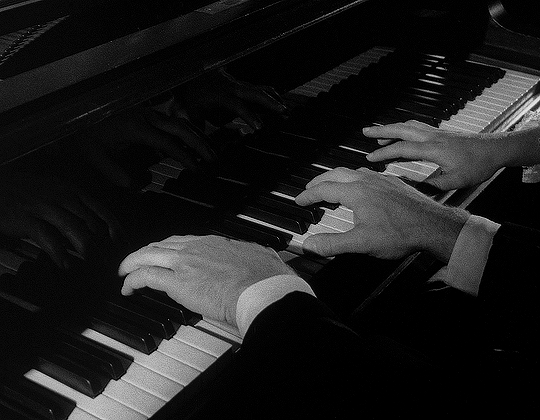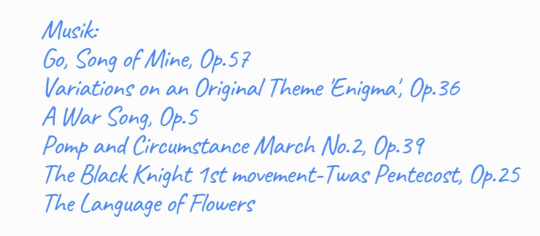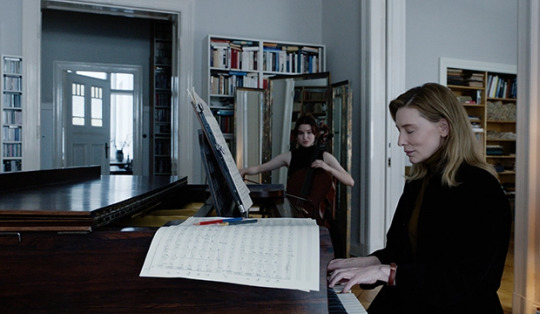#Elgar
Text


50 composers
#bach#mozart#beethoven#haydn#handel#paganini#schubert#mendelssohn#chopin#schumann#liszt#brahms#strauss#tchaikovsky#dvorak#elgar#mahler#debussy#rachmaninoff#stravinsky#ravel#gershwin#shostakovich#bernsterin
183 notes
·
View notes
Photo


ELGAR (1962) | dir. Ken Russell
446 notes
·
View notes
Text



Grieg&Elgar's Musiks. They're a teenage idol group managed by Handel (who is said to be Bach's old friend), competitors of ClaKla but they are privately friends.


The cane of Elgar releases Musiks by touching the ground with. The number of touches, frequency, and amount of force applied (tapping or hitting) determines the Musik that is going to be released.
6 notes
·
View notes
Text
Tár (2022)

If Mahler stated that a symphony should be the world, then Lydia Tár’s professional symphony is crumbling around her. This is a story of grooming and professional corruption, about using power to take advantage of others and exploit them for what you desire. Yet Todd Field resisted the urge to make a simple Harvey Weinstein type story, opting instead to use the incredibly specific and incredibly dense palette of classical music and the orchestral industry as his palette. The movie doesn’t hold the viewer’s hand in the least; from moment one, references and nods are flying fast and loose, calling out everyone from Furtwängler and Karajan to Marin Alsop and Michael Tilson Thomas. Hildur Guðnadóttir plays a clever double-role, mentioned by name alongside peers such as Jennifer Higdon but also furnishing elements of the diegetic and non-diegetic soundscape. Extended rehearsal sequences in Tár’s pidgin German play out free of subtitles. The minutiae of orchestral union proceedings are debated time and again. All of these references, all of this time, all of this vocabulary is necessary to establish the zealous obsession that surrounds the craft for Tár. She has crafted her whole identity around being the next soothsayer of the Western canon, the protégée of Bernstein himself. More importantly, it’s a veneer of legitimacy. It’s clear from the start that the maestro is less than “politically correct”: a dressing-down of a Juilliard student regarding his opinions on contemporary art music and views on Bach steps beyond the pale of a misguided tough love approach and more into the territory of personal attack. But this is a pattern. Fields approaches the everyday administrative details of Tár’s life with the same meticulousness. Insidious little instances begin to float to the surface, indicating a predatory tendency that others notice and become increasingly intolerant toward. The camera lingers on Lydia’s assistant Francesca as she lip-syncs her boss’s plaudits during a public interview, casts furtive glances or begins to wonder why she’s being asked certain things. Even the matter of handing over a laptop becomes a dangerous prospect. And the conductor’s wife and colleague, concertmaster Sharon Goodnow, becomes increasingly disillusioned with Tár’s actions as a new affair begins to become apparent in newcomer cellist Olga. In this sense, the deliberate and clinical handling of camera in many scenes begins to build a case against the maestro, feeling in beats almost akin to The Assistant. A specific event involving a fellow for a program Tár started for women conductors lingers in the shadows, eluded to but never fully elucidated. Krista Taylor had no prospects in the field after Tár torpedoed her career. The maestro insists this was due to Taylor’s mental instability, but other evidence suggests that there was a revenge aspect to this. The fantasy life of private jets and book talks can be ripped away so quickly.
And yet the fantasy of it all does have its place in the tapestry of this narrative. As with music, there is room for ambiguity here, space to interpret. Especially in the back half of the film, Field calls into question Tár’s state of mind through her troubled dreams and strange nocturnal discoveries. Distorted images of the women in her life haunt her, intertwined with moments in the Amazon recalling her past ethnomusicological work. Yet as things begin to unravel and Tár loses the thread, the nature of objective reality becomes more tenuous. As with the scandal reveal, it’s subtle at first. In her rehearsal home, the maestro is haunted by a persistent doorbell sound, which heartbreakingly later turns out to be the elderly woman next door in distress. The legacy of Krista Taylor’s fallout and eventual suicide comes in the form of labyrinthine drawings which appear in gift book inscriptions, metronome faces, or formed in clay in her adoptive daughter’s room. Just where these come from or who makes them is never made explicit, but that doesn’t make them any less haunting for Tár. As she courts Olga, or seduces her, the cellist becomes ever more disillusioned with Tár just as she becomes more elusive. At one point, Tár chases Olga into the seemingly abandoned building where she perhaps resides, only to find the cellist vanished, seemingly a figment of her imagination. Descending into the basement, she instead finds a fox or a wolf, her predatory nature turning back on her. Ghosts haunt the periphery. By the time it has all fallen away, she rushes onto the stage mid-performance, attacking her impostor, claiming the score for herself. It’s her work, she alone can interpret it. Utterly fallen from grace, the final sequences play out like a sort of bizarro-world fantasy. New York is no longer a place of glamour, but an ugly outer borough rail station, everything drab and grey and muddy. Her final gig is the coup de grace. She is engaged to perform a Japanese work for a Southeast Asian concert hall. The final shot is a bitterly funny punch in the gut: she’s at the bottom of the barrel, performing video game music for a rapt audience of cosplayers. Goodbye haughty, lofty concert halls.
Noémie Merlant, Nina Hoss, and Sophie Kauer all turn in strong, nuanced performances. But Cate Blanchett is the obvious powerhouse here. She’s fun as the haughty, dismissive maestro who knows just how it’s all done. This makes her fall all the more pathetic, not even able to see her daughter. It’s a late scene which cements just how hard this has all hit her, and a brilliant piece of acting from Blanchett. Sitting alone at her old family home in New York with a childhood field hockey medal around her neck, Tár watches a recording of one of Leonard Bernstein’s Young People’s Concerts where he describes how music can be used to communicate ideas words cannot. Her face says it all: this is her whole world still, but now she no longer can access it, by her own hand. She controlled time with her baton, but she cannot control others in the same fashion.
THE RULES
PICK ONE
Select either MAHLER FIVE or the ELGAR CELLO CONCERTO and sip whenever that work is mentioned.
SIP
Someone name-drops a composer or conductor.
The narrative transitions to a new city.
Lydia calls someone a robot.
A scene contains a language other than English spoken in dialogue.
BIG DRINK
A labyrinth is drawn on something.
Tár cuts off the orchestra during rehearsal.
#drinking games#tar#todd field#cate blanchett#noemie merlant#sophie kauer#nina hoss#drama#oscars 2023#mahler#elgar#hildur guðnadóttir
43 notes
·
View notes
Photo

Cumhurbaşkanlığı Senfoni Orkestrası
29 Mart 2024 Cuma, 20:00
CSO Ana Salonu
Çaykovski | Piyano Konçertosu
Elgar | Enigma Çeşitlemeleri
2 notes
·
View notes
Text
"We'll win, of course," he said.
"You don't want that," said the demon.
"Why not, pray?"
"Listen,"said Crowley desperately, "how many musicians do you think your side have got, eh? First grade, I mean."
Aziraphale looked taken aback.
"Well, I should think—" he began.
"Two," said Crowley. "Elgar and Liszt. That's all. We've got the rest. Beethoven, Brahms, all the Bachs, Mozart, the lot. Can you imagine eternity with Elgar?"
Aziraphale shut his eyes. "All too easily," he groaned.
Lmao an eternity with elgar? shoot me. Crowley is 100% right. hell any day thanks
Also, wHy iS LisZt iN hEaVeN? dO yOu KnOw ThE aMoUnT oF pAiN tHaT mAn CaUsEs tO PiANisTs aRoUnD tHe WorLd???? Not to mention a wHoLe liszt (get it) of supposedly 'sinful' things he did that should have gotten him kicked out of heaven. Smoking, drinking, cheating, etc etc
Also also, I'm surprised Crowley didn't mention paganni, given he was famous for the rumour about how he sold his soul to the devil in order to be more virtuosic at the violin.
#crowley#aziraphale#good omens#neil gaiman#classical music#musician#music#liszt#franz liszt#elgar#edward elgar#ineffable
23 notes
·
View notes
Text
listening to elgar while i curse the education system and finish up a project 🤙
6 notes
·
View notes
Text
Salut d'amour(Greetings of Love ):Elgar Classic
A woman sighed, "Why do men like the song 'Pomp and circumstance'?" I feel like I understand. It's often used in boxing title fights to honor the winner. It's probably a song that men like. On the other hand, in the case of “Salut d'amour ”, she will accept the orthodox love song. Episodes of two of Elgar's masterpieces. But as a man, I prefer Pomp and circumstance.
愛の挨拶(エルガー) クラシック
「なんで男のひとは、”威風堂堂”なんて曲が好きなの?」と嘆息した女性がいた。わからんでもない。ボクシングのタイトルマッチで、勝者を称えるときによく使われるし。男性好みの曲ではあろう。いっぽう”愛の挨拶”の場合、正統的なラブソング、その彼女も受け入れるだろう。エルガーの代表作2曲のエピソード。でも、男の私は、「威風堂堂」のほうをより好む。
#Salut d'amour#Greetings of Love#Babylman#Elgar#Classic#Pomp and circumstance#boxing#orthodox love song
5 notes
·
View notes
Text
youtube
#Music#Videos#Edward Elgar#Elgar#Jacqueline du Pré#Jacqueline du Pre#Cello#Cello concerto#I wanted to continue SIGNALIS right now but I'm on a musical detour right now h#Youtube
9 notes
·
View notes
Text
youtube
3 notes
·
View notes
Text
Their Place
#anime#anime cap#gundam#gundam ibo#gundam iron blooded orphans#kidō senshi gundam tekketsu no orphans#mikazuki augus#kudelia aina bernstein#atra mixta#orga itsuka#akihiro altland#ride mass#eugene sevenstark#hush middy#dante mogro#merribit stapleton#zack lowe#elgar#hirume#embi
14 notes
·
View notes
Text

OTD in Music History: Composer and conductor Edward Elgar (1857 - 1934) is born in England.
Although Elgar is often regarded as a prototypically “English” composer, most of his musical influences were not from England, but rather from continental Europe -- i.e., Johannes Brahms (1833 - 1897), Antonin Dvorak (1841 - 1904), and Richard Strauss (1864 - 1949).
Furthermore, in many ways, Elgar actually felt himself to be an outsider in British society. In musical circles dominated by academics, he was a self-taught composer; in Protestant Britain, his Roman Catholicism was regarded with suspicion in some quarters; and in the highly class-conscious society of the Victorian and Edwardian Eras, he always remained acutely aware of his own humble origins (even after he achieved an international artistic reputation and secured financial independence).
Among Elgar's best-known compositions are the "Enigma Variations", the "Pomp and Circumstance" marches, concertos for violin and cello, and two symphonies. He also composed a number of large-scale choral works (most famously the "The Dream of Gerontius"), as well as a wide array of chamber music and songs. He was appointed to the prestigious position of "Master of the King's Musick" in 1924.
Views of Elgar's proper stature in the world of "classical" music have varied widely in the decades since he first rose to prominence at the beginning of the 20th Century. Famed conductors like Hans Richter (1843 - 1916) and Arthur Nikisch (1855 - 1922) both rated him very highly; by contrast, however, Herbert von Karajan (1908 - 1989) summarily dismissed his "Enigma Variations" as "second-hand Brahms"...
PICTURED: A c. 1910s real photo postcard showing the middle-aged Elgar seated in a formal pose.
#classical music#music history#opera#bel canto#composer#classical composer#aria#classical studies#Edward Elgar#Elgar#Symphony#Romance#Intermezzo#chamber#orchestra#Sonata#Serenade#Sea Pictures#concert#concerto#Speak Music !#classical history#opera history#classical musician#musicians#music#musician#chest voice#historian of music#Dream Children
4 notes
·
View notes
Text
My friend gave me a kalimba yesterday so I've been trying to learn how to play Salut d'Amour one of my favourite songs
2 notes
·
View notes
Text

Elgar - Magna Carta 2
0 notes
Audio
Elgar | Enigma Çeşitlemeleri, Tema & çeş.1

17 notes
·
View notes